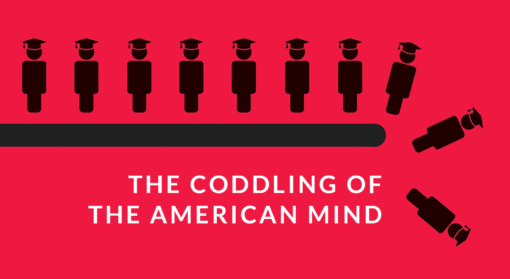The New York Times calls him “the most influential public intellectual in the Western world right now.” He inspires heartfelt admiration or abject loathing, and very little in between. In these uncertain times it seems essential to have an opinion about Jordan Peterson. But Skeptic contributor Stephen Beckner can’t quite make up his mind.
Tags
-
browse by topic
psychology
eSkeptic for October 31, 2018
Dr. Jonathan Haidt — Coming Apart

A lecture by and follow-up discussion with Dr. Jonathan Haidt about the excessive divisiveness of American politics and culture the past several years.
eSkeptic for October 17, 2018
Science Salon Podcast # 42: The Meaning of Life, the Universe, and Everything. A dialogue between Michael Shermer and psychologist Clay Routledge (Supernatural: Death, Meaning, and the Power of the Invisible World) on life’s deepest and most meaningful issues.
Great Untruths

Anondah Saide and Kevin McCaffree review The Coddling of the American Mind: How Good Intentions and Bad Ideas are Setting Up a Generation for Failure by Greg Lukianoff and Jonathan Haidt.
Dr. Clay Routledge — The Meaning of Life, the Universe, and Everything

Shermer speaks with psychologist Clay Routledge about: the evolution of motivation and goals in animals and humans • what a “purpose driven life” really means • how atheists and nonbelievers can create meaningful and purposeful lives • the self, personal identity, and existential psychology • why people believe in God and fear death • why religious people live longer and healthier lives • why one-third of atheists believe in some type of life after death • free will as a…
eSkeptic for September 26, 2018
Have Archetype—Will Travel by Michael Shermer attempts to explain the startling phenomenon of Jordan Peterson; not the man’s ideas so much as his message and following, which has grown astronomically in the past two years, from obscure Canadian professor of psychology to international man of mystery: mysterious to nearly everyone, that is, on exactly what it is he believes.
Have Archetype — Will Travel: The Jordan Peterson Phenomenon

Michael Shermer attempts to explain the startling phenomenon of Jordan Peterson; not the man’s ideas so much as his message and following, which has grown astronomically in the past two years, from obscure Canadian professor of psychology to international man of mystery: mysterious to nearly everyone, that is, on exactly what it is he believes.
Reports of Mysterious Attacks on U.S. Diplomats Continue: Separating Fact from Fiction

As reports of mysterious “sonic attacks” continue, Robert Bartholomew examines the flaws in a study that was published in the prestigious Journal of the American Medical Association (JAMA) by a team of neurologists who examined American Diplomats who believe they were victims of such attacks last year in Havana, Cuba.
eSkeptic for September 19, 2018
In Science Salon # 38, Michael Shermer and Hebrew University historian and best-selling author (Sapiens, Homo Deus), Dr. Yuval Noah Harari, discuss the central ideas of his new book, 21 Lessons for the 21st Century.
Dr. Jonathan Haidt — The Coddling of the American Mind: How Good Intentions and Bad Ideas are Setting Up a Generation for Failure

In this fascinating dialogue Dr. Haidt and Dr. Shermer discuss what has been going wrong on many college campuses in the last few years. Speakers are shouted down. Students and professors say they are walking on eggshells and are afraid to speak honestly. Rates of anxiety, depression, and suicide are rising—on campus as well as nationally. How did this happen?
Jordan Peterson’s Evidence-Based Endeavor

Jonathan N. Stea avers that the self-help material that psychologist Jordan Peterson provides to the masses mirrors the principles found in evidence-based clinical psychological literature.
eSkeptic for June 6, 2018
Available Now: Skeptic Magazine 23.2 — The Rise of the Nones and the Decline of Religion; Feature: Jordan Peterson’s Evidence-Based Endeavor; MonsterTalk # 158: An interview with Richard Hatem (Part II).
eSkeptic for April 11, 2018
In this week’s eSkeptic, Michael Shermer interviews Dr. Leonard Mlodinow about his new book: Elastic: Flexible Thinking in a Time of Change; and Daniel Loxton reflects on the value of listening in order to first understand paranormal beliefs and then communicate effectively with those who hold them.
Dr. Leonard Mlodinow — Elastic: Flexible Thinking in a Time of Change

Out of the exploratory instincts that allowed our ancestors to prosper hundreds of thousands of years ago, humans developed a cognitive style that Leonard Mlodinow terms elastic thinking, a collection of traits and abilities that include neophilia (an affinity for novelty), schizotypy (a tendency toward unusual perception), imagination and idea generation, pattern recognition, mental fluency, divergent thinking, and integrative thinking.
eSkeptic for October 25, 2017

Could a sonic weapon have focused a wave of energy with pinpoint accuracy on American diplomats in Cuba? In this week’s eSkeptic, Robert E. Bartholomew presents a plausible explanation for the illness cluster reported by State Department officials: mass psychogenic illness.
The “Sonic Attack” on U.S. Diplomats in Cuba: Why the State Department’s Claims Don’t Add Up

Could a sonic weapon have focused a wave of energy with pinpoint accuracy on American diplomats in Cuba? Robert E. Bartholomew presents a plausible explanation for the illness cluster reported by State Department officials: mass psychogenic illness.
The Negative Side of Positive Psychology
The oversimplified litany of alleged benefits of positive thinking is scientifically problematic. New research keeps whittling away at previously discussions of the benefits of positive psychology such that it is barely a shadow of its former hulking self. Carol Tavris examines the negative side of positive psychology.
eSkeptic for February 17, 2016
The oversimplified litany of alleged benefits of positive thinking is scientifically problematic. New research keeps whittling away at previously discussions of the benefits of positive psychology such that it is barely a shadow of its former hulking self. In this week’s eSkeptic, we present Carol Tavris’ column, “The Gadfly,” from Skeptic magazine 19.3 (2014) in which she examines the negative side of positive psychology.
I Don’t Know What You Mean

Daniel Loxton describes recent research "On the Reception and Detection of Pseudo-Profound Bullshit," and reflects on the communications chasm that can exist between skeptics and believers.
Dr. Carol Tavris — On the Future of Gender, Race & Human Nature
What will people look like centuries from now? How will they act? What race and gender roles that we take as natural today will be the same or different in the far future? In this insightful look into the future Carol Tavris, one of today’s most prominent social scientists and psychologists, considers how blinded we all are to the influences of the times in which we live.
SKEPTIC App
Whether at home or on the go, the SKEPTIC App is the easiest way to read your favorite articles. Within the app, users can purchase the current issue and back issues. Download the app today and get a 30-day free trial subscription.










